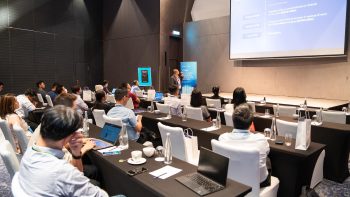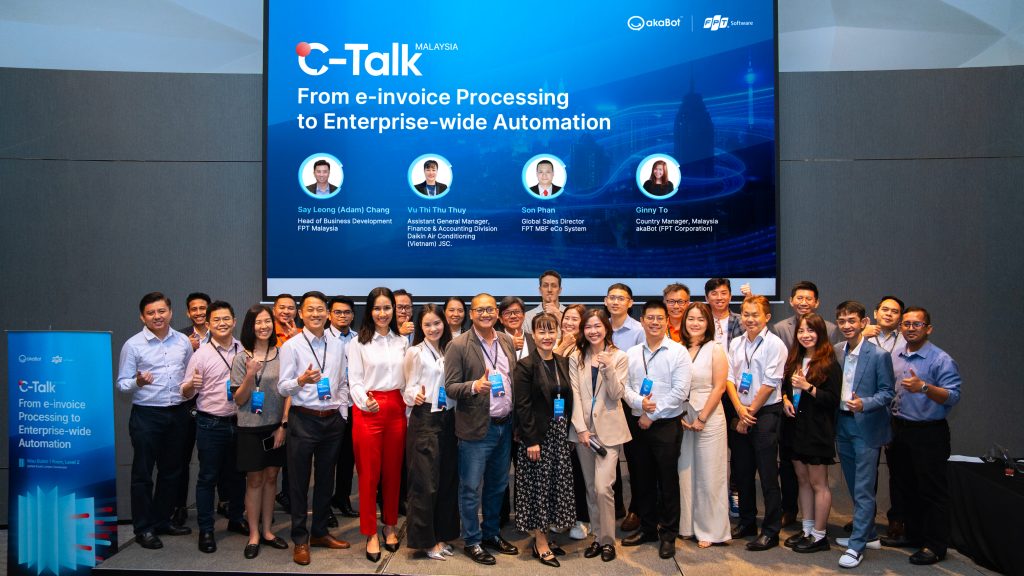
akaBot, a worldwide leader in robotic process automation solutions as ranked by Gartner, has announced a new end-to-end automation solution to manage the mandatory e-invoicing required by businesses in Malaysia. The announcement came during the second C-talk event hosted by akaBot, where they showcased their new solution for e-invoice issuing and processing, tailored specifically for Malaysian businesses.
With e-invoicing becoming mandatory for most businesses operating in Malaysia starting August 2024, a lengthy process is mandated to ensure the completion of the e-invoice, involving invoice issuance, conversion to XML format, verification and clearance, QR code attachment, sending the invoice to the buyer, and archiving. By leveraging an end-to-end invoice process automation solution from FPT—the leading IT corporation with 15+ years of foundation in Malaysia—the whole process can be automated to reduce 50% of processing time and achieve completion in just three minutes.
A case study shared by Daikin Vietnam demonstrates how the akaBot’s SaaS version—UBot—can help with the remaining purchase invoice processing. The “virtual assistant” helps to read and extract invoice data automatically, verifying the invoice in the General Tax Department system.
The process also involves identifying and blocking duplicate payment cases, eventually addressing Daikin Vietnam’s need to manage data centrally for secure storage and easy look-up. As much as 80% of the process is now automated, reducing 75% of invoice processing time from 2 minutes to 30 seconds, equal to 130 working days being saved per year and ensuring 100% accuracy.
Ginny Truc To, Country Manager of akaBot Malaysia said, “From our view, the new regulations on mandatory e-invoice hold various opportunities for Malaysian enterprises to save time and resources on tax compliance, avoid the risk of invalid or illegal invoices and finally, streamline the financial operations. However, we also foresee many challenges regarding regulatory compliance and technological readiness and transition. This is the chance for akaBot to leverage our experience in the industry and provide our technology solutions to a broader scope of businesses in the market.”
To added: “Our experience with brands like Daikin in Vietnam and our growing portfolio of businesses in Malaysia has given us a strong foothold to scale up and tackle real-world issues in the local business community.”

akaBot: Leading an Enterprise-Wide Automation Scenario in Malaysia
When strategically implemented, RPA can yield substantial returns on investment. Businesses typically achieve an average ROI of 250%, recouping their initial investment within six to nine months after RPA deployment. Looking at the higher side, this ROI percentage can go up to 380%.
The latest trends of automation scenario for Malaysian enterprises in 2024–2025 will be about how RPA combines with top-notch technologies such as Artificial Intelligence, Machine Learning, and Intelligent Document Processing (IDP).
The automation for e-invoice processing is just one of the vertical-specific solutions that many companies will invest in this year, regarding customer service, supply chain management or financial services.
At the C-Talk event, Ginny further showcased some typical cases where RPA is combined with other technologies to automate from low-complexity to high-complexity processes. For instance, a Malaysian premium quality baking supplier decided to apply RPA to an on-demand stock tracking process, with the virtual bots doing 90% of the tasks such as combining data from 4 reports, consolidating the final report, and sending reports to the relevant department.
On the other hand, while integrating RPA and IDP, akaBot assists another Malaysian insurance firm with its health records & test results processing. This technology combination helps to solve 500+ cases per day with 100% SLA guaranteed, releasing employees from 4,200 repetitive working hours per year.
\For example, Optical Character Recognition (OCR) and IDP are also applied in the e-invoice automation process of akaBot to define nine categories of e-invoice with 53 data fields exactly. Therefore, this end-to-end solution can be scaled to support both larger and smaller clients depending on their needs, ensuring to cater to a wider range of Malaysian businesses.
 (0)
(0) (0)
(0)Archive
- October 2024(44)
- September 2024(94)
- August 2024(100)
- July 2024(99)
- June 2024(126)
- May 2024(155)
- April 2024(123)
- March 2024(112)
- February 2024(109)
- January 2024(95)
- December 2023(56)
- November 2023(86)
- October 2023(97)
- September 2023(89)
- August 2023(101)
- July 2023(104)
- June 2023(113)
- May 2023(103)
- April 2023(93)
- March 2023(129)
- February 2023(77)
- January 2023(91)
- December 2022(90)
- November 2022(125)
- October 2022(117)
- September 2022(137)
- August 2022(119)
- July 2022(99)
- June 2022(128)
- May 2022(112)
- April 2022(108)
- March 2022(121)
- February 2022(93)
- January 2022(110)
- December 2021(92)
- November 2021(107)
- October 2021(101)
- September 2021(81)
- August 2021(74)
- July 2021(78)
- June 2021(92)
- May 2021(67)
- April 2021(79)
- March 2021(79)
- February 2021(58)
- January 2021(55)
- December 2020(56)
- November 2020(59)
- October 2020(78)
- September 2020(72)
- August 2020(64)
- July 2020(71)
- June 2020(74)
- May 2020(50)
- April 2020(71)
- March 2020(71)
- February 2020(58)
- January 2020(62)
- December 2019(57)
- November 2019(64)
- October 2019(25)
- September 2019(24)
- August 2019(14)
- July 2019(23)
- June 2019(54)
- May 2019(82)
- April 2019(76)
- March 2019(71)
- February 2019(67)
- January 2019(75)
- December 2018(44)
- November 2018(47)
- October 2018(74)
- September 2018(54)
- August 2018(61)
- July 2018(72)
- June 2018(62)
- May 2018(62)
- April 2018(73)
- March 2018(76)
- February 2018(8)
- January 2018(7)
- December 2017(6)
- November 2017(8)
- October 2017(3)
- September 2017(4)
- August 2017(4)
- July 2017(2)
- June 2017(5)
- May 2017(6)
- April 2017(11)
- March 2017(8)
- February 2017(16)
- January 2017(10)
- December 2016(12)
- November 2016(20)
- October 2016(7)
- September 2016(102)
- August 2016(168)
- July 2016(141)
- June 2016(149)
- May 2016(117)
- April 2016(59)
- March 2016(85)
- February 2016(153)
- December 2015(150)
